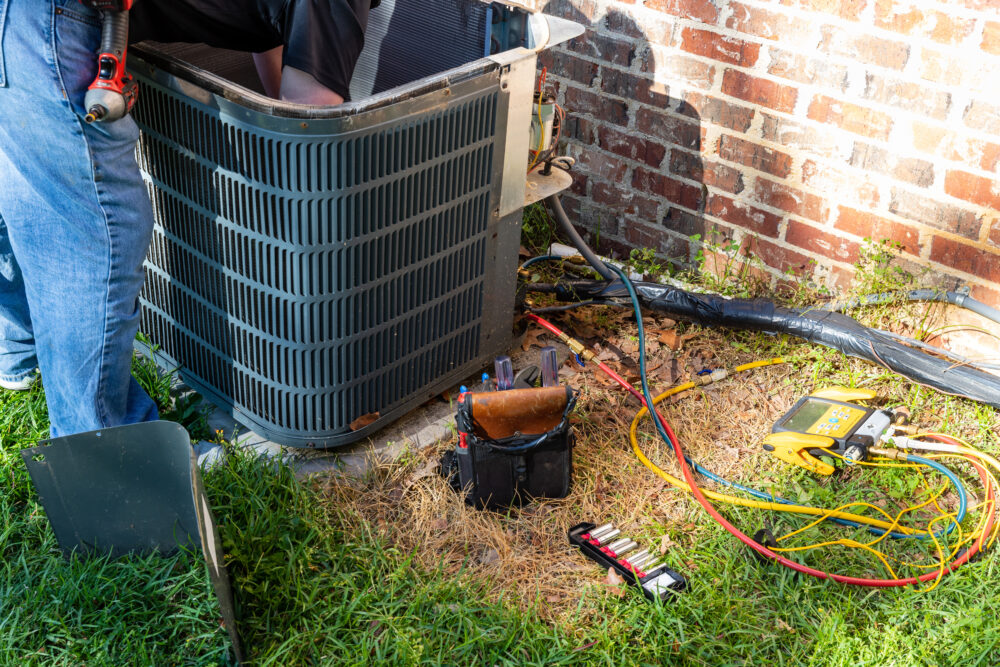HVAC Summer Tune-Up Components
When your air conditioning system fails on the hottest day of summer, you quickly realize how much you depend on it. According to the Department of Energy, heating and cooling account for nearly half of your home’s energy costs, making your HVAC system one of your most important investments. A comprehensive essential HVAC summer tune-up isn’t just routine maintenance—it’s your insurance policy against costly breakdowns and sky-high energy bills.
Many homeowners assume their HVAC system will simply keep working until it doesn’t, but this reactive approach often leads to emergency repairs that could have been prevented. At Texas Air Tech, we’ve seen countless situations where a simple tune-up would have saved homeowners thousands of dollars in replacement costs and weeks of discomfort during peak summer heat.

Air Filter Inspection and Replacement
Your air filter serves as the first line of defense for your HVAC system, yet it’s often the most neglected component. During a summer tune-up, technicians examine your current filter to assess its condition and airflow restriction. A clogged filter forces your system to work harder, increasing energy consumption by up to 15% according to EPA studies.
The inspection process involves checking the filter type, proper sizing, and installation direction. Many homeowners unknowingly use filters that are either too restrictive for their system or installed backward, both of which can cause significant efficiency problems. Professional technicians also evaluate whether your current filter meets your home’s specific needs, considering factors like pet ownership, allergies, and local air quality conditions.
Electrical Connection Assessment
Electrical components are the nervous system of your HVAC unit, and loose connections can create dangerous conditions while reducing system efficiency. During this critical inspection, technicians examine all electrical connections, measuring voltage and amperage to ensure they meet manufacturer specifications.
The assessment includes checking capacitors, which help motors start and run efficiently. Failed capacitors are among the most common causes of HVAC breakdowns, yet they’re relatively inexpensive to replace during routine maintenance. Technicians also inspect contactors, relays, and control boards for signs of wear or corrosion that could lead to system failure.
Refrigerant Level Evaluation
Your air conditioning system relies on precise refrigerant levels to operate efficiently, and even small leaks can significantly impact performance. Professional technicians use specialized gauges to measure refrigerant pressure and compare readings to manufacturer specifications for your specific system and current weather conditions.
Low refrigerant levels don’t just reduce cooling capacity—they can cause your compressor to overheat and fail, resulting in repair bills that often exceed the cost of a new system. During the evaluation, technicians also inspect refrigerant lines for signs of leaks, corrosion, or damage that could compromise system integrity.
Condenser and Evaporator Coil Cleaning
Dirty coils are efficiency killers that can increase your energy bills by 30% or more. The outdoor condenser coil becomes clogged with dirt, pollen, and debris throughout the year, while the indoor evaporator coil collects dust and biological growth that restricts airflow and heat transfer.
Professional coil cleaning involves more than spraying water on the unit. Technicians use specialized cleaners and techniques to remove buildup without damaging delicate fins or coil surfaces. They also straighten bent fins that can restrict airflow and inspect the coil housing for proper drainage and insulation.
Thermostat Calibration and Programming
Your thermostat controls when and how your system operates, making its accuracy crucial for both comfort and efficiency. During calibration, technicians verify that your thermostat reads temperature accurately and cycles your system at appropriate intervals.
Modern programmable and smart thermostats offer significant energy savings when properly configured. Technicians review your current settings and help optimize schedules based on your family’s routine and local climate patterns. They also check for proper installation, adequate clearance from heat sources, and compatibility with your HVAC system.
A comprehensive HVAC summer tune-up from Texas Air Tech addresses these essential components and more, helping you avoid the stress and expense of emergency repairs. Our experienced technicians take the time to explain their findings and recommendations, empowering you to make informed decisions about your home comfort system. Don’t wait for your system to fail when the heat becomes unbearable—schedule your HVAC summer tune-up today and enjoy peace of mind throughout the cooling season.
